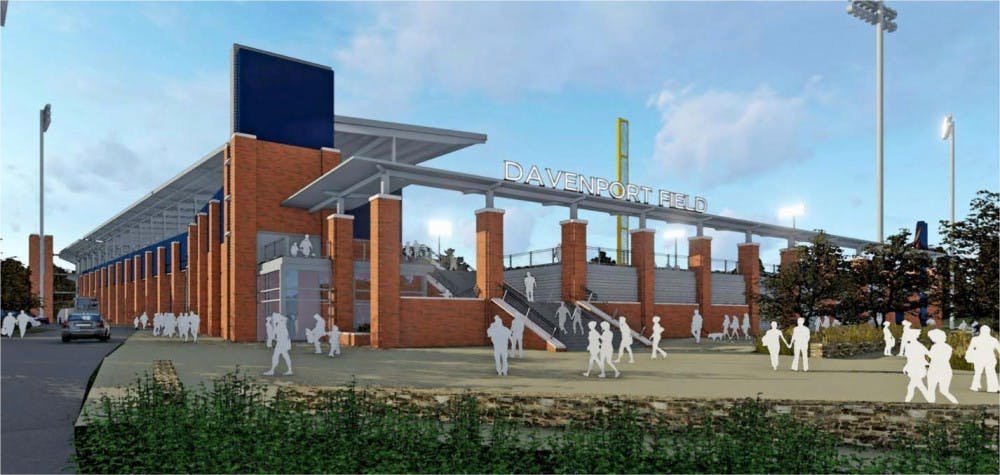The Board of Visitors’ Buildings and Grounds Committee met Friday morning in the Rotunda to discuss plans for construction and development on Grounds, ranging from renovations to the baseball stadium to a sustainability partnership with Dominion Power.
The meeting began with remarks from Committee Chair Kevin Fay and continued with a presentation from Colette Sheehy, University senior vice president for operations.
The committee approved a plaque honoring the late Army Capt. Humayun Khan, a College graduate and the sole University alumnus killed during the Iraq War.
Khan’s family came to national prominence this summer following a speech from his father, Khizr Khan, at the Democratic National Convention. Khizr Khan spoke in support of Hillary Clinton and condemned then-candidate Donald Trump’s comments about Muslims.
A Charlottesville resident, Khizr Khan visited the University in November and spoke about his son’s time at the University.
The plaque will be placed at the Rotunda and include Humayun Khan’s name and the quote, “He stands in the unbroken line of patriots who dared to die that freedom might live.”
The committee also heard architect and engineer selections for the Brandon Avenue upper-class student residence hall and the Center for Human Therapeutics.
Goody Clancy was selected to construct the residence hall, and Perkins + Will was selected to construct the Center for Human Therapeutics.
Additionally, the committee approved naming the entrance to Thornton Hall as Kullman Plaza, in recognition of Ellen and Michael Kullman, the parents of two Engineering School alumni and donors to the school.
The committee also approved the addition of a $12 million renovation to the third floor of Pinn Hall to the University’s capital projects program.
University Architect Alice Raucher reported on three schematic design reviews — the expansions of the baseball stadium and Ivy Stacks, and the construction of the Old Ivy Road Office Building.
The expansion of the baseball stadium at Davenport Field will include a new entry plaza, improved Americans with Disabilities Act parking and additional seating, as well as new bathrooms and concession areas.
The baseball stadium will cost $12.7 million, with an additional $3.5 million for infrastructure and safety improvements.
The Ivy Stacks — located two miles from Grounds — provides storage for books, special collections and research materials. The expansion is needed to provide additional storage for materials and accommodate future growth in the library system, according to the University.
Raucher said the Ivy Stacks expansion will cost $7.5 million and require 16,000 square feet for construction.
“We’re aiming to begin occupancy in fall 2017,” Raucher said of Ivy Stacks. “The entire building [will have] specialized facilities.”
Schematic designs for a new 100,000 square foot office building on Old Ivy Road were also presented. The project — estimated at $30.3 million — will relocate several administrative offices currently housed at the Fontaine Research Park to the new building.
Raucher updated the committee on plans for designing the Memorial for Enslaved Laborers and spoke about a community forum held Dec. 2 during which attendees discussed plans for the memorial.
“There were many competing events [that night],” Raucher said. “Considering all that, we had very great attendance.”
The committee selected the Boston-based firm Howeler + Yoon in September to design the memorial. The conceptual design is anticipated in June.
The public engagement process has also included a meeting in November, and the next public meeting will be held Jan. 23 at the Jefferson School.
After Raucher’s presentation, Sheehy presented on the University’s efforts to make Grounds more sustainable.
“The University does a lot in terms of sustainability,” Sheehy said. “It’s a really grassroots effort.”
In particular, there has been student demand for courses about sustainability, Sheehy said, adding that the demand exceeds the supply. But this imbalance might be solved with the help of the Strategic Investment Fund, she said.
“The committee has some significant goals this year, sustainability being one of them,” Sheehy said. “[We’re] really advancing.”
Dominion Power has collaborated with the University in order to achieve greater sustainability on Grounds by helping the University to install solar panels on the roof of Ruffner Hall and creating the U.Va. Hollyfield Solar project in King William County, VA.
“The big solar announcement today about a facility that we’re engaged in with Dominion Virginia Power is quite exciting,” Sheehy said. “We’re really moving the needle on achieving our carbon reduction goal.”
“The U.Va. Hollyfield facility is benefitting the Commonwealth,” Jim Eck, Dominion vice president of business development, said. “It produces jobs.”
Dominion Power is focused on reducing carbon emissions through the partnership, and has seen a 41 percent reduction in carbon emissions, Eck said.
“We are excited to expand the partnership,” Eck said. “We’re excited to support universities’ commitment to sustainability.”
The University held a ribbon-cutting ceremony for solar panels Dec. 6 for new solar panel systems on Ruffner Hall, as well as the University Bookstore.







